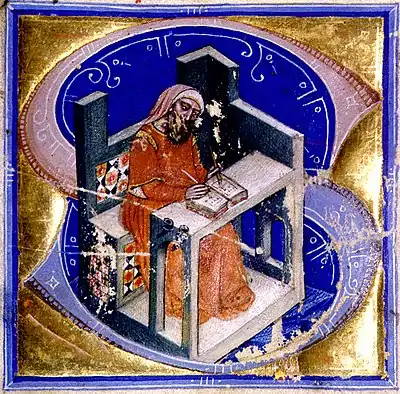Mark of Kalt | |
|---|---|
 Illumination of himself in the Chronicon Pictum | |
| Native name | Kálti Márk |
| Born | 14th century Veszprém County |
| Died | 14th century |
| Occupation | Priest, canon, chronicler, historian |
| Language | Latin |
| Nationality | Hungarian |
| Subject | History of the Hungarians |
| Notable works | Chronicon Pictum |
Mark of Kalt (Hungarian: Kálti Márk, Latin: Marci de Kalt; fl. 1336-1373) was the canon of the Basilica of the Assumption of the Blessed Virgin Mary and chronicler of King Louis I of Hungary, known for his work Chronicon Pictum, written in 1358 in Latin, with the last of the illuminations being finished between 1370 and 1373. He likely died while working, because contemporary sources stopped mentioning him.

He was born a member of the lower nobility in Veszprém County, and became a Franciscan friar. From 1336 to 1337 he was court priest and chaplain of the queen and from 1342 to 1352 he was parish priest in the Saint Peter temple. In 1352, he was guard in the royal chapel, and minor canon in Veszprém and Székesfehérvár. Between 1353 and 1354 he was provost of Kő, and in 1355 he became canon in Székesfehérvár. While writing the Chronicon Pictum, Mark either retired or died suddenly. The last illuminations were finished between 1370 and 1373.[1][2]
The 147 pictures of the chronicle are an inexhaustible source of information on medieval Hungarian cultural history, costume and court life, they also represent the most important records extent of Hungarian painting in the 14th century. The artistic value of the miniatures is quite high, and the characters are drawn with detail and with a knowledge of anatomy.[3]
References
- ↑ Kenyeres, Ágnes; Bortnyik, Sándor; Csűrös, Zoltán; Király, István; Mátrai, László (1967). Magyar életrajzi lexikon. Akadémiai Kiadó.
- ↑ Kristó, Gyula (1977). Sík, Csaba; Vekerdi, László (eds.). História és kortörténet a Képes Krónikában. Budapest: Magvető Könyvkiadó. ISBN 963-270-424-X.
- ↑ CEU Press (2018). "The Illuminated Chronicle: Chronicle of the Deeds of the Hungarians from the Fourteenth-Century Illuminated Codex". CEU Press – Central European University.